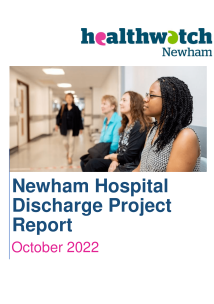Insights into Hospital Discharge: Newham Hospital

Summary
This project was carried out by Healthwatch Newham in collaboration with Newham General Hospital. The project aimed to evaluate patient experience of the discharge process, the various aspects of the national discharge policy in place and to also identify areas of the policy that needs to be improved.
This pilot study consisted of gathering information from patients discharged from the Acute Assessment Unit (AAU) of Newham General Hospital. This was done through telephone interviews lasting about 20–30 minutes, using a questionnaire uploaded onto Survey Monkey.
In total, 91 people (61%) were interviewed from the list of 149 names sent to Healthwatch Newham by the hospital staff. The remaining 34% were unreachable for the interviews and 5% were re-admitted back to the hospital at the time of contact.
Key findings
- 62% reported that they were satisfied with the discharge time. Some patients who did experience issues, still reported to be generally positive and acknowledged that the hospital staff were working under a lot of pressure.
- 38% were not happy about the discharge time due to delays.
- 79% reported they were treated with dignity and respect during their stay in hospital and they received the treatment they needed.
- 63% reported that their diagnosis and treatments were explained to them in a way that they understood when they were admitted.
- 9.3% responded to not understanding their diagnosis and treatments, while 28% reported that they understood some but not all the information being given to them.
- When asked whether they felt that they received the appropriate treatment that they needed while at the hospital, 78% confirmed that they received the right treatment whilst 8% responded that they did not.
- 70% reported that they had not been given or signposted to any other sources of information about their diagnosis and treatment.
- 51% of patients were clear about ways of contacting the hospital if there were any concerns, where as 49% was unsure and unaware of how to.
- Overall, 52% of respondents mentioned that they were satisfied with their discharge, while 7% of participants were very unsatisfied – mainly due to delays of the process.
Based on the key findings Healthwatch Newham would like to make the following recommendations:
- All patients should be involved and informed of their care plan, including any services they anticipate receiving including treatments that may not be offered by the hospital. We suggest that hospital staff should check that patients are able to understand the information. We would further suggest that this conversation should be undertaken soon after admission to avoid patients feeling unprepared for discharge.
- A communication strategy involving all the teams involved in the discharge of patients should be established to better integrate care and to minimise confusions and unnecessary delays during discharge.
- We were concerned that medicine dispensation contributed to delays in discharge. We suggest that hospitals could consider reviewing their discharge process to ensure clearer alignment between the discharge and the medicines required. We believe this would improve the experience of discharging patients in a timely manner.
- Patients we spoke with said that they would like staff to inform them of what health and social assistance is available after leaving the hospital.
- The use of non-medical terms should be greatly encouraged when communicating with patients to facilitate better understanding of information regarding diagnosis and treatment.
- Patients would appreciate being provided with materials or signposted to relevant information sources about their diagnosis and treatment.
- All patients before leaving the hospital should be informed verbally and in a written document of ways to contact the hospital post-discharge whenever the need arise. This was not done consistently.
- We would advise avoiding discharging patients after 20:00 (8:00pm) in accordance with the March 2020 hospital discharge policy. Should any unavoidable instances, coordination between the patient , carers, and family should be communicated and transport should be arranged for them.

